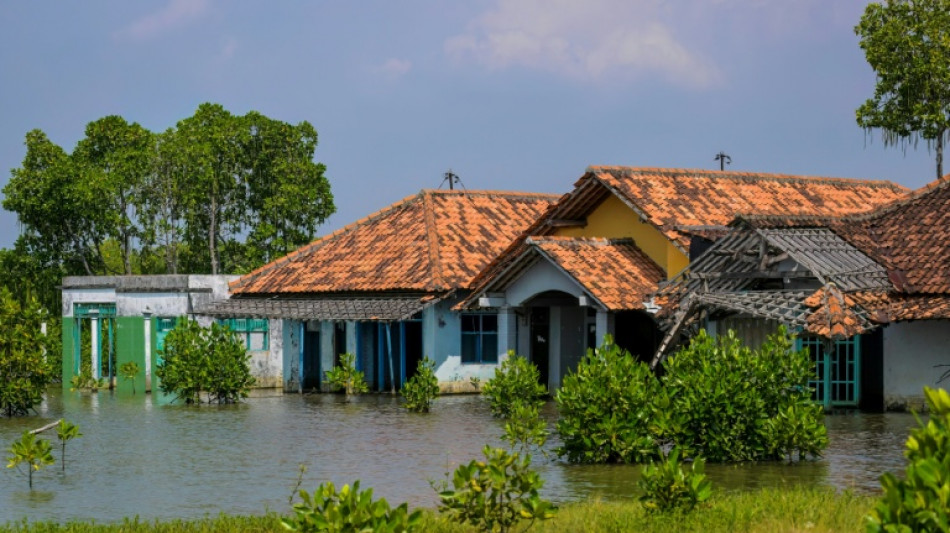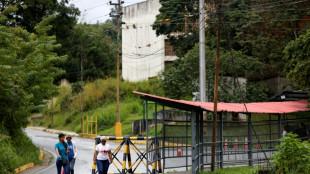
-
 Sabalenka fires Australian Open warning with Brisbane domination
Sabalenka fires Australian Open warning with Brisbane domination
-
In Gaza hospital, patients cling to MSF as Israel orders it out

-
 New protests hit Iran as alarm grows over crackdown 'massacre'
New protests hit Iran as alarm grows over crackdown 'massacre'
-
Svitolina powers to Auckland title in Australian Open warm-up

-
 Keys draws on happy Adelaide memories before Australian Open defence
Keys draws on happy Adelaide memories before Australian Open defence
-
Scores of homes razed, one dead in Australian bushfires

-
 Ugandan opposition turns national flag into protest symbol
Ugandan opposition turns national flag into protest symbol
-
Bears banish Packers, Rams survive Panthers playoff scare

-
 'Quad God' Malinin warms up for Olympics with US skating crown
'Quad God' Malinin warms up for Olympics with US skating crown
-
India eyes new markets with US trade deal limbo

-
 Syria's Kurdish fighters agree to leave Aleppo after deadly clashes
Syria's Kurdish fighters agree to leave Aleppo after deadly clashes
-
New York's Chrysler Building, an art deco jewel, seeks new owner

-
 AI toys look for bright side after troubled start
AI toys look for bright side after troubled start
-
AI pendants back in vogue at tech show after early setback

-
 Grateful Dead co-founder and guitarist Bob Weir dies aged 78
Grateful Dead co-founder and guitarist Bob Weir dies aged 78
-
Myanmar votes in second phase of junta-run election

-
 'One Battle After Another' heads into Golden Globes as favorite
'One Battle After Another' heads into Golden Globes as favorite
-
Rams survive Panthers scare to advance in NFL playoffs

-
 Rallies across US after woman shot and killed by immigration agent
Rallies across US after woman shot and killed by immigration agent
-
Egypt dump out holders Ivory Coast as Nigeria set up AFCON semi with Morocco

-
 Rosenior salutes 'outstanding' start to Chelsea reign
Rosenior salutes 'outstanding' start to Chelsea reign
-
Maduro loyalists stage modest rally as Venezuelan govt courts US

-
 Byrne late penalty fires Leinster into Champions Cup last 16 after 'ding-dong' battle
Byrne late penalty fires Leinster into Champions Cup last 16 after 'ding-dong' battle
-
Rosenior makes flying start as Chelsea rout Charlton in FA Cup

-
 Rallies across US against shooting of woman by immigration agent
Rallies across US against shooting of woman by immigration agent
-
Salah closer to AFCON glory as Egypt dethrone champions Ivory Coast

-
 O'Neil ends 'crazy three days' with Strasbourg cup canter
O'Neil ends 'crazy three days' with Strasbourg cup canter
-
Mitchell leads Cavs over T-Wolves

-
 O'Neil ends 'crazy few days' with Strasbourg cup canter
O'Neil ends 'crazy few days' with Strasbourg cup canter
-
Argentina wildfire burns over 5,500 hectares: governor

-
 Byrne late penalty fires Leinster into Champions Cup last 16
Byrne late penalty fires Leinster into Champions Cup last 16
-
Roma beat Sassuolo to close in on Serie A leaders Inter

-
 Villa's FA Cup win at Spurs leaves Frank on the brink
Villa's FA Cup win at Spurs leaves Frank on the brink
-
Osimhen focused on Nigeria glory not scoring record

-
 Undav calls shots as Stuttgart thump Leverkusen
Undav calls shots as Stuttgart thump Leverkusen
-
Venezuelan prisoners smile to hear of Maduro's fall

-
 Thousands of Irish, French farmers protest EU-Mercosur trade deal
Thousands of Irish, French farmers protest EU-Mercosur trade deal
-
Kiplimo captures third straight world cross country title

-
 Osimhen leads Nigeria past Algeria into AFCON semi-finals
Osimhen leads Nigeria past Algeria into AFCON semi-finals
-
US urges fresh talks between Syria govt, Kurds after deadly clashes

-
 Weekend of US protests after woman killed by immigration agent
Weekend of US protests after woman killed by immigration agent
-
Monaco cling on with 10 men to avoid French Cup shock

-
 Rooney close to tears as brother masterminds FA Cup history
Rooney close to tears as brother masterminds FA Cup history
-
Semenyo scores on Man City debut in 10-goal rout of Exeter

-
 Villarreal sink Alaves to stay in La Liga hunt
Villarreal sink Alaves to stay in La Liga hunt
-
Bristol, Glasgow reach Champions Cup last 16

-
 Freiburg beat 10-man Hamburg to climb to eighth in the Bundesliga
Freiburg beat 10-man Hamburg to climb to eighth in the Bundesliga
-
Venezuela loyalists to rally one week after Maduro's capture

-
 Syrian authorities transferring Kurdish fighters from Aleppo to northeast
Syrian authorities transferring Kurdish fighters from Aleppo to northeast
-
Football: Five memorable FA Cup upsets


Can a giant seawall save Indonesia's disappearing coast?
The encroaching ocean laps against a road in Karminah's village, threatening her home on Indonesia's Java island, where the government says it has a plan to hold back the tide.
It wants to build an $80-billion, 700-kilometre (435-mile) seawall along Java's coast to tackle land loss as climate change lifts sea levels and groundwater extraction prompts land to sink.
For residents who have seen the tide come more than a kilometre inland in parts of Java, the plan sounds like salvation.
But with a timeline of decades and uncertain financing, it looks unlikely to arrive quickly enough, and climate experts warn it could make matters worse by pushing erosion elsewhere and disrupting ecosystems.
For Karminah, 50, those concerns feel distant.
"What's important is that it doesn't flood here. So that it's comfortable," she told AFP in Bedono village, referring to a coastal road that disappears almost daily.
"School can't happen, the children can't play, they can only sit on the pavement staring at the water."
The government calls the colossal wall one of its "most vital" initiatives to help coastal communities in Java, which houses more than half of Indonesia's 280 million citizens, as well as fast-sinking capital Jakarta.
Bedono residents like village chief Muhammad Syarif currently elevate their homes with clay soil but say a seawall is "very much needed" to avert disaster.
"It is the right solution because the coastline needs wave management," he said.
Funding remains uncertain, though President Prabowo Subianto has urged Asian and Middle Eastern investment.
This week, he inaugurated a new agency to oversee the project.
"I don't know which president will finish it, but we will start it," Prabowo said in June.
- Abandoned villages -
Seawalls and other coastal fortifications have been used globally to keep damaging tides at bay.
In Japan, fortress-like barriers were installed in some places after the 2011 earthquakes and tsunami, while the Netherlands relies on a system of hill-like dikes to stay dry.
Such fortifications absorb and deflect wave energy, protecting coastal infrastructure and populations.
But Indonesia's needs are urgent, with one to 20 centimetres (0.4 to eight inches) of land disappearing along Java's northern coast annually.
Large areas will vanish by 2100 on the current climate change trajectory, according to environmental non-profit Climate Central.
The fortifications can also have negative consequences, destroying beaches, pushing erosion seaward, and disrupting ecosystems and fishing communities.
In places like Puerto Rico and New Caledonia, seawalls have collapsed under the constant beat of waves, which also erode sand below.
"They come at considerable environmental and social cost," said Melanie Bishop, professor at Australia's Macquarie University.
"Their construction leads to loss of shoreline habitat and they impede movement of both animals and people between land and sea," the coastal ecologist said.
A 2022 UN report warned seawalls only offer a temporary fix and can even worsen climate change effects.
For Indonesian crab farmer Rasjoyo, coastal erosion is not a theoretical problem.
He and hundreds more once lived in now-abandoned Semonet village, where seawater laps into evacuated homes. It now lies a 20-minute boat ride from land.
"The floods were getting worse. The house was sinking. Every month, the change was drastic," the 38-year-old told AFP.
He says the seawall -- first proposed in 1995 -- will come too late.
"If it happens, when will it arrive here? In what year?" he asked.
"It might not be very effective either, because the land has already subsided."
- 'Find a solution' -
Some climate experts believe nature-based solutions like mangroves and reefs would be better alternatives.
"Unlike seawalls that would need to be upgraded as sea levels rise, these habitats accrete vertically," said Bishop.
"In some instances this vertical accretion can keep pace with sea level rise."
Another alternative could be a mixture of relocations and more targeted, limited seawalls, said Heri Andreas, a land subsidence expert at the Bandung Institute of Technology.
"The win-win solution is a partial or segmented seawall," he said, describing the current proposal as like "killing a duck with a bazooka".
"It is more effective if we do relocation. And then in some parts, maybe only a coastal dike or elevating the coastal infrastructure would be enough."
He hopes to persuade Prabowo's administration to switch course before the mega-project begins.
"We need more listening," he said. "It's a bit better than before, but it's not enough yet."
In Bedono, where a cemetery was recently relocated to save it from the waves, residents simply want a fast fix.
"The solution is to build something, I don't know, just build a road, a dike or a coastal belt so it doesn't keep happening," said Karminah.
"What can we do?" she added. "Please help me find a solution so the water doesn't rise."
M.AbuKhalil--SF-PST


